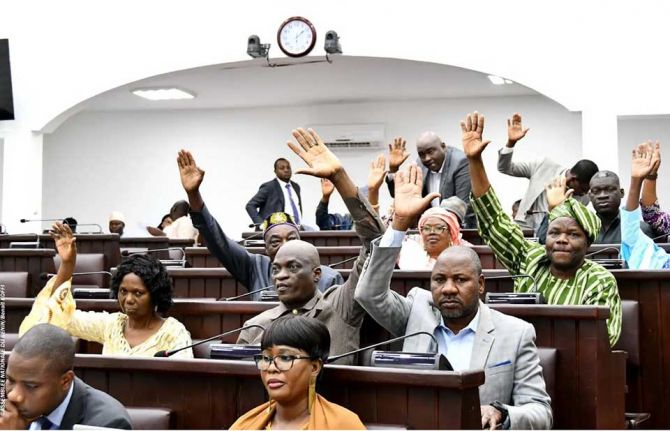
Feature Story
African law students argue against criminalisation of HIV transmission
12 October 2010
12 October 2010 12 October 2010
Dr Meskerem Grunitzky Bekele, Director of the UNAIDS Regional Support Team for West and Central Africa and Maître Robert Dossou, President of the Constitutional Court of Benin (centre), with students from the winning team of the 19th African Human Rights Moot Court Competition. Credit: UNAIDS
More than 120 young law students from 60 universities representing 24 African countries gathered in Cotonou (Benin) from 4-9 October 2010 to compete in the 19th African Human Rights Moot Court Competition.
Law students argued on a hypothetical human rights case as if they were before the African Court on Human and Peoples’ Rights. Law lecturers served as judges in the preliminary rounds and internationally recognised human rights law experts adjudicated the final round of the competition.
Held in a different country each year, this annual competition was organised by the Centre for Human Rights at the University of Pretoria (South Africa) in collaboration with the UNESCO Chair in Human Rights and Democratisation at the Université d’Abomey-Calavi in Benin.
“The competition provided an amazing opportunity for us, law students, to put our legal training into practice,” said Ms Evy Carole Bouo, from the Université de Cocody (Cote d’Ivoire) who participated in proceedings. “It gave us the chance to meet and interact with prominent African and international legal and human rights experts,” she added.
This year’s hypothetical case raised several human rights issues, including the criminalisation of HIV transmission. Human rights and health experts, civil society organisations and people living with HIV have raised concerns in relation to laws criminalising HIV transmission on the grounds that the overly-broad application of these legal provisions may reinforce HIV-related stigma. Such laws may also deter people from seeking HIV prevention, treatment and care services for fear of prosecution, and may lead to human rights violations.
In their written submissions, students argued, among others, that the overly-broad criminalization of HIV transmission is contrary to the principles of justifiable limitations of human rights provided under the African Charter on Human and People’s Rights and international law.
The removal of “punitive laws, policies, practices, stigma and discrimination that block effective responses to HIV” is one of UNAIDS priority areas as outlined in its Outcome Framework 2009-2011.
During this year’s Moot Court Competition, UNAIDS, UNFPA and UNESCO launched a project, in collaboration with the Centre for Human Rights at the University of Pretoria to compile information on the legal and policy issues relating to HIV and young people in Africa. The project will map laws and policies related to access to HIV-related education for young people, the minimum age of consent to HIV testing, and access to HIV prevention and treatment for young people.
Professor Frans Viljoen, Director of the Centre for Human Rights, noted that this joint initiative with UNAIDS, UNFPA and UNESCO “shows the relevance of the Moot Court Competition for human rights education in Africa and also for getting students involved in a critical research project that can positively influence legal and policy debates in their countries and beyond.”
Speaking at the closing ceremony of the competition, Dr Meskerem Grunitzky Bekele, Director of the UNAIDS Regional Support Team for West and Central Africa emphasised the importance for young law students to get involved in the discussions on complex issues related to HIV and the law.
“An enabling and protective response to HIV that challenges discrimination and empowers all individuals, including young people, to access HIV prevention, treatment and care services is needed today more than ever”, Dr Bekele said.
The inclusion of HIV in this year’s case afforded participants the chance to apply their understanding and knowledge of human rights theory to contemporary issues of concern in Africa such as HIV.
The winner of this year’s competition was the team composed by the Université de Cocody, Côte d’Ivoire (Ms Evy Carole Bouo and Mr Jean-Camille Kouadio), the University of Namibia (Ms Stephanie de Klerk and Mr Albert Titus), and Rhodes University, South Africa (Ms Ingrid Cloete and Mr Fausto Di Palma).
Established in 1992, the African Human Rights Moot Court Competition is the largest annual gathering of law faculties in Africa. It was awarded the UNESCO Prize for Human Rights Education, recognising it as the most far-reaching human rights educational initiative on the continent. Over the past 19 years, it has brought together thousands of students from 131 universities in 48 African countries.



